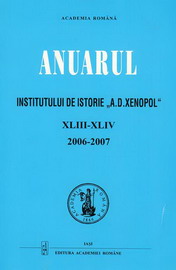Atitudini româneşti pro şi contra U.R.S.S. în Parlamentul României (1919-1925)
Attitudes in favour of U.S.S.R. and against Romanian Parliament (1919-1925)
Author(s): Radu FilipescuSubject(s): History
Published by: Editura Academiei Române
Keywords: Basarabia; bolschevic state
Summary/Abstract: In the period between the World Wars, Romania has a neighbour, U.S.S.R., the first communist state in the world. Because of the litigation concerning Basarabia, the two states have no diplomatic relations. In spite of this, information concerning the bolshevic state, although not always accurate, are rich, and are discussed by the Romanian public opinion. In the Parliament from Bucharest, the bolshevic state has no a good fame. More than this, the “Red Russia” was considered the heiress of the “White Russia”, of the former Empire foreign affaires. The hopes regarding a possible reconciliation were weak, because both the Kremlin authorities and the Russian emigration have the same ideas concerning the territory between Prut and Dniester. The Soviet realities were regarded carefully in Romania. They were debated in Parliament being often compared with the local political and social ones. Romanian socialists were the only admirers of U.S.S.R. At least, till the 1921 scission, they were idealizing the Soviet state. Later, became illegal, some communists remained followers of the bolshevism. Others, like the socialists, were critics of the soviet regime, considered a failure. The National Liberal Party tried to present the negative aspects of the Soviet society. It often accused the Romanian opposition of secret links with the bolshevics. At its turn, the opposition highlighted some abuses of the government party, charged of dictatorial practices. Also, it is important to mention that all the members of the Romanian Parliament were against an intervention in the Soviet home affairs. Some soviet realities were wrongly perceived in Romania. For example, the New Political Economy was considered by the Peasant Party a triumph of the Russian Peasants against bolshevics. Also, after the death of Vladimir I. Lenin, Gregory Zinoviev was considered the sure successor. The name of Joseph Stalin did not appear in the Romanian Gazette along these years. The great number of discussions regarding U.S.S.R. proves a great concern among the Romanian politicians regarding the neighbouring country. It was understood that the events over the Dniester could influence even our country’s history.
Journal: Anuarul Institutului de Istorie »A.D. Xenopol« - Iaşi
- Issue Year: 2006
- Issue No: 43+44
- Page Range: 493-506
- Page Count: 13
- Language: Romanian

